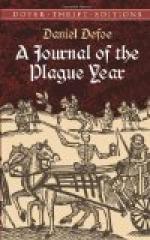[225] The constables.
[226] The carters.
[227] The goods.
[228] In spite of, notwithstanding.
[229] Supply “who.”
[230] “Cum aliis,” i.e., with others. Most of the places mentioned in this list are several miles distant from London: for example, Enfield is ten miles northeast; Hadley, over fifty miles northeast; Hertford, twenty miles north; Kingston, ten miles southwest; St. Albans, twenty miles northwest; Uxbridge, fifteen miles west; Windsor, twenty miles west; etc.
[231] Kindly regarded.
[232] Which.
[233] The citizens.
[234] Such statements.
[235] For “so that,” substitute “so.”
[236] How.
[237] It was not known in Defoe’s time that minute disease germs may be carried along by a current of air.
[238] Affected with scurvy.
[239] “Which,” as applied to persons, is a good Old English idiom, and was in common use as late as 1711 (see Spectator No. 78; and Matt. vi. 9, version of 1611).
[240] Flung to.
[241] Changed their garments.
[242] Supply “I heard.”
[243] At.
[244] Various periods are assigned for the duration of the dog days: perhaps July 3 to Aug. 11 is that most commonly accepted. The dog days were so called because they coincided with the heliacal rising of Sirius or Canicula (the little dog).
[245] An inn with this title (and probably a picture of the brothers) painted on its signboard.
[246] Whom.
[247] The Act of Uniformity was passed in 1661. It required all municipal officers and all ministers to take the communion according to the ritual of the Church of England, and to sign a document declaring that arms must never be borne against the King. For refusing obedience to this tyrannical measure, some two thousand Presbyterian ministers were deprived of their livings.
[248] Madness, as in Hamlet, act iii. sc. 1.
[249] “Represented themselves,” etc., i.e., presented themselves to my sight.
[250] “Dead part of the night,” i.e., from midnight to dawn. Compare,
“In the dead waste and middle of the night.”
Hamlet, act i. sc 2.
[251] “Have been critical,” etc., i.e., have claimed to have knowledge enough to say.
[252] Being introduced.
[253] The plague.
[254] “First began” is a solecism common in the newspaper writing of to-day.
[255] Literally, laws of the by (town). In modern usage, “by-law” is used to designate a rule less general and less easily amended than a constitutional provision.
[256] “Sheriff” is equivalent to shire-reeve (magistrate of the county or shire). London had, and still has, two sheriffs.
[257] Acted.
[258] The inspection, according to ordinance, of weights, measures, and prices.




